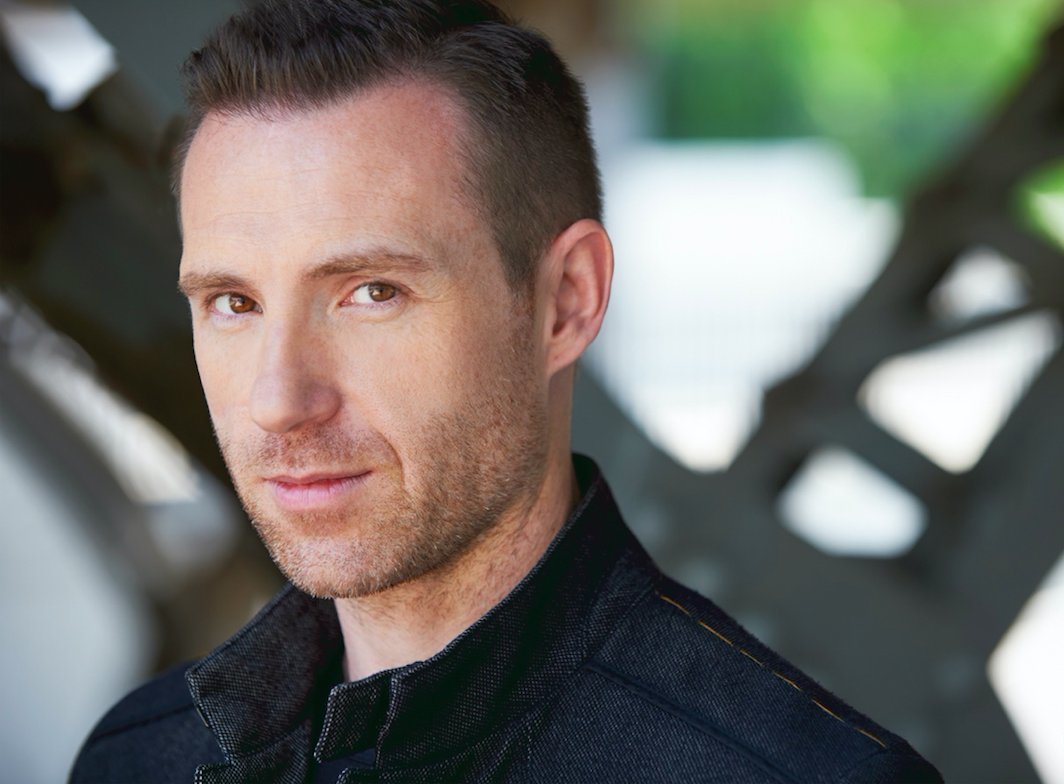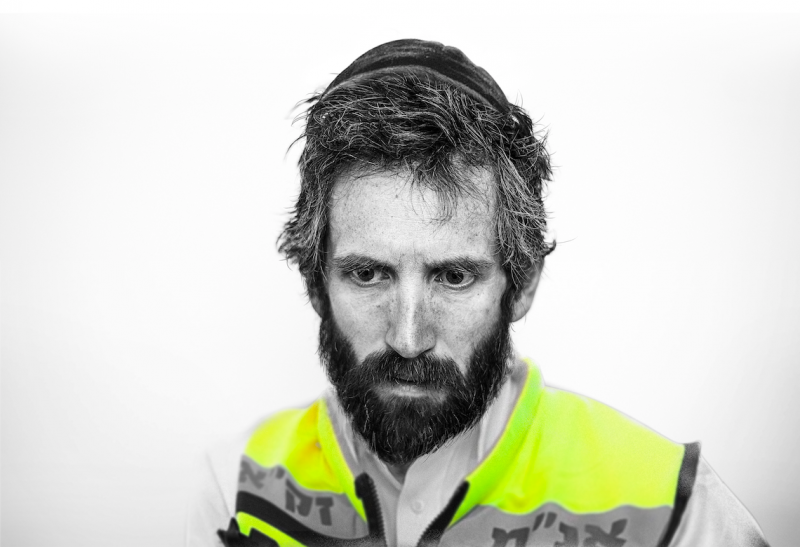Interview: Christopher Morris Delves into the Research and Writing Behind THE RUNNER

After numerous trips to Israel and nearly a decade of writing and refining, Human Cargo's artistic director and playwright Christopher Morris's newest show, THE RUNNER, is ready for audiences at Theatre Passe Murailles. Morris took time to delve into the process behind the show's research and inspiration, giving us a look into how the one-man show was created - and how the idea came to him over 20 years ago.
"Back when I was in high school, probably in 1992, I heard a news report on CBC about ZAKA. This was when they first started, and I remember hearing about Orthodox Jewish men collecting remains after a suicide bombing - I couldn't believe that something like it existed. It's something I never forgot, and over the years I always thought it would be a great starting point for theatre."
It wasn't until the late 2000's that this lifelong interest in a group so far removed from Canada would take a leading role in Morris's life. "I was brought up Catholic, so I have no cultural or religious ties to the region - I felt I could be there objectively, but even with that in mind it was an overwhelming experience." In 2010 he made his first trip to Israel, staying in Jerusalem and travelling frequently to Tel Aviv to meet with and talk to members of ZAKA.
During this trip, Morris met a man who would end up being the inspiration for THE RUNNER'S sole character, a ZAKA volunteer named Jacob (played by Gord Rand). "(This man) lived in Kibbutz across from Jordan, and I spent a lot of time with him over the years. He told me a story about one event where he helped someone in a car accident he responded to, where he saved a young person. A few months later he was in the same hospital as the person he helped, who was then in a vegetative state, and he was faced with a lot of dilemmas. He told me he had questioned 'Should I help them pass? Did I save them to burden a family now?' - just all of these human questions that I empathize with."
"That instance, and the essence of his character are aspects that made it into the play, but mostly it's this man's beauty, sensitivity, and compassion that can be seen because he was such an articulate and expressive person."
Following Morris's return to Canada, he worked on numerous iterations of the script before a second trip to Israel in 2013, after which he teamed up with renowned dramaturg and eventual director of THE RUNNER, Daniel Brooks. "I had worked with Daniel over the years on several shows, including when he was the artistic director at Necessary Angel. He became a part of it right after my 2013 trip, after which I had a few writing sprees and workshops with him - and it made real sense for him to go with me on the next trip I made to Israel."
Morris stayed nearly 8 weeks in 2016, with Brooks joining him for the final 3. "He's Jewish and hadn't been there since he was a young man - I thought it was important for him to go and see how it's changed and really take in the environment." Prior to travelling with Brooks, Morris notes that he had struggled with what exactly the story would be. "Early attempts were literal - there were multiple characters and a structured timeline. It felt insincere, and it didn't work - but it was on that 2016 trip that the form changed, and I decided to make it a solo show about a man preparing for judgement, and the play really found its form from there."
Although the core of the show was in place by 2016, Morris still struggled with how to position the story in a way that respected both sides of its conflict. The show is described as a look into Jacob's psyche "as he grapples with the political and moral fallout of saving a Palestinian woman's life," however his community turns on him because the saved woman is suspected of stabbing an Israeli soldier. ZAKA's initial stance at it's inception was to follow the Hippocratic oath and rules of triage, which are that the most injured person at the scene of an accident is to be assisted first, even if that person is the perpetuator of violence; however, that stance changed in 2015 when ZAKA announced that they would begin helping the victims first, causing upheaval in the organization as many members then had to re-examine their personal beliefs.

Addressing this sensitive topic was something that Morris spent a great deal of time on. "That's where the dilemmas begin. The thing is, to many people in Israel it makes perfect sense - to the general public this wasn't a shameful thing. But what about the people who work for ZAKA who had moral objections to the new stance? It lends itself to a very complicated human dilemma that could be shown onstage, and that is the core of the play - what happens to someone who stands up for saving a life? The play shows the ramifications that has when it's done in an atmosphere that has experienced a lot of violence. Theatre is about human dilemmas, and I was curious to ask them (ZAKA volunteers) what the challenges and problems were for them. That started to reveal unique and specific discussions of morality, and of right and wrong."
Not only did Morris examine the concept of personal morality, but he had to account for the sensitivity of the show's setting and subject matter. "The 2 biggest lessons, the things that have guided me through this process - one, that there's been a long, long, long history of global antisemitism that goes back thousands of years. And two, there is also a persistent denial of the rights of Palestinians. These two things exist side by side."
"That was the biggest lesson I learned and the biggest thing I had to respect while writing. I had to make sure these two things were front and center. Anything dealing with that part of the world can be an instantly divisive proposition, but more and more I felt like my whole focus was on ZAKA and its members. The work they do is extraordinary."
With extensive research in place and this concept of morality at the centre of the story, Morris was essentially ready to begin writing. He also found himself leaning on Brooks' input, given the director's extensive experience working on one-person shows. "He (Brooks) offered very simple questions that always reminded me: who is the audience, and what is the relationship between the performer and the audience - this aspect has been one of the biggest learning curves for me, and continues to be as we head towards previews and opening."
"I've never written a one-person show - and my initial instinct for THE RUNNER was that it was a one-person show. It was a surreal circumstance that this person found himself in - and this is a lesson I'm learning - is that usually these first instincts are the best. I'm learning to embrace them faster, as it's something I'm finding with writing and directing - those initial instincts prove to be fertile ground that should be embraced. It's really crazy to think it took six years to go on this long journey, from beginning the research and initially seeing this as a one-person show, and that it took me so long to find that those instincts were right. Hopefully in the future I won't have to take six years again!"
Just because the curtain is rising on THE RUNNER doesn't mean that Morris will be taking a break anytime soon, though; he spent a period of time this past summer in central Africa researching Doctors Without Borders and has spent time in China for another piece. Both shows are in the initial research stages that THE RUNNER once was in too, and he hopes to see them on stage someday as well. "(THE RUNNER) fits in with the overall trajectory of Human Cargo - we've produced NIGHT, which we developed in Nunavut, and PARADISE, where we spent time in Pakistan and Afghanistan. This is how we create work and it's been wonderful to continue in this way. It's really great to have the opportunities for research and engagement, and although it doesn't always work, I find it incredibly rewarding and think that each time our shows get stronger through the process."
THE RUNNER is on stage through December 9 at Theatre Passe Muraille, 16 Ryerson Ave, Toronto, ON.
For more information or to buy tickets, visit https://humancargo.ca/?p=51
Comments
Videos

